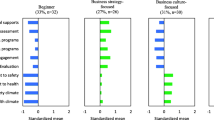Abstract
In a small company, the whole company culture, including the management style, is dominated by the owner. The management culture in small companies and above all the management style of the owner determine the chances of successfully introducing workplace health promotion (WHP). For this reason a typology was developed that describes the management personalities who affect the company culture in small enterprises. This provides a guide to the possible success of WHP in connection with the management style. Although a summary of the management and corporate culture of small companies in a few categories cannot show the variety of social reality, it can provide orientation. The typical categories of company social order (a mixture of ownership and leadership) in small and medium-sized enterprises are given below. Furthermore, there is an assessment of what the chances of realising workplace health promotion are in each type of company. Small and medium-sized companies (SME) have a number of organisational characteristics which are just ideal for the introduction and implementation of workplace health promotion. The work of the employer and employees is often the same. Information in the company is generally comprehensive and easily available. The lack of information which employees often complain about in large companies is not a problem. There is a good flow of communication. Small companies have a flat hierarchy that enables participation, the essential requirement for WHP. There is a close social relationship between the company head and the workforce, although it must be said that this closeness can be dangerous, particularly if it is misused as complete social control. The readiness to implement Workplace Health Promotion (WHP) in SME and the degree of success depends largely on the personality of the company manager and the style of leadership. Considering the importance of a manager’s personality for WHP in SME, modules and instruments to assist company owners and managers in SME are to be developed. On behalf of and in co-operation with the Austrian Network for Workplace Health Promotion several modules have been introduced to assist owners and managers of SMEs.
Similar content being viewed by others
References
Badura B, Hehlmann T (2003) Betriebliche Gesundheitspolitik. Der Weg zur gesunden Organisation. Springer, Berlin Heidelberg
Becker R, Erlemann H-P (1992) Zehn Führungsgebote für Manager. HARVARD BUSINESSmanager 14:35–42
Bennis W (1993) An Invented Life. Reflections on Leadership and Change. Addison-Wesley, Reading
Buchegger-Traxler A (2003) Machen führungskräfte krank? Führungsverhalten und Gesundheit. WISO 26:65–83
Champy J (1995) Reengineering Management. The Mandate for New Leadership. Harper Collins, New York
European Network Workplace Health Promotion (1998) The Luxembourg declaration on workplace health promotion in the European union. WHP-Net-News 4:2–3
Farkas ChM, Wetlaufer S (1996) The ways chief executive officers lead. Harvard Bus Rev May-June:110–122
Fonds Gesundes Österreich (2005) WEG - Wirtschaftlicher Erfolgsfaktor Gesundheit. Hilfsmittel, Anleitungen und Materialen für den Weg zu einem gesunden Unternehmen. Österreichische Kontaktstelle für Betriebliche Gesundheitsförderung, Linz
Fukuyama F (1995) Trust. The Social Virtues and the Creation of Prosperity. The Free Press, New York
Gaugler E, Weber A (1995) Perspektiven des human resource management. Personal 1:4–9
Grossmann R (1998) Gesundheit durch Projekte fördern. In: Österreichische Kontaktstelle für Betriebliche Gesundheitsförderung (ed) Projektmanagement in der Betrieblichen Gesundheitsförderung. Institut für Gesellschafts- und Sozialpolitik, Linz, pp 19–33
Hamel G, Prahalad CK (1994) Competing for the Future. Harvard Business School Press, Boston
Hammer M, Champy J (1993) Reengineering the Corporation. A Manifesto for Business Revolution. Harper Collins, New York
Hurrelmann K (2000) Gesundheitssoziologie. Eine Einführung in sozialwissenschaftliche Theorien von Krankheitsprävention und Gesundheitsförderung. Juventa, Weinheim München
Kothoff H, Reindl J (1990) Die soziale Welt kleiner Betriebe. Wirtschaften, Arbeiten und Leben im mittelständischen Industriebetrieb. Otto Schwartz & Co., Göttingen
Lux W, Stadelmann M (1995) Aktuelle Management-Konzepte: Merkmale, Vorteile, Nachteile. IO Management Zeitschrift 64:72–74
Mayrhofer W (1999) Manager tun nichts, sie reden nur!? Zur Bedeutung (zukünftiger) Manager aus systemtheoretisch-konstruktivistischer Perspektive. In: Eckardstein D et al (eds) Management. Theorien - Führung - Veränderung. Schäffer-Poeschl, Stuttgart pp 257–269
Meggeneder O (2005) Krankenstände vermeiden - Fehlzeiten reduzieren. Ein Leitfaden für Betriebe. Linde, Vienna
Meggeneder O (2006) Das Linzer Gesundheitszirkelmodell. In: Meggeneder O, Hirtenlehner H (eds) Zehn Jahre Betriebliche Gesundheitsförderung in Österreich. Forschungsstand - Strukturen - Entwicklungen. Mabuse, Frankfurt/Main, pp 191–200
Meggeneder O, Sochert R (1999) WHP interventions and work organisation: the health circle approach. Promot Educ 3:14–16
Naidoo J, Wills J (2003) Lehrbuch der Gesundheitsförderung. Verlag für Gesundheitsförderung, Cologne
Nothnagel A (1998) Mitarbeiter beurteilen ihre Vorgesetzten, In: HARVARD BUSINESSmanager 20:97–105
Österreichisches Netzwerk BGF (2003) Qualität in der Betrieblichen Gesundheitsförderung. Conference Report, Tuesday, 28th January 2003. Linz
Senge P et al (1999) The Dance of Change. The Challenges of Sustaining Momentum in Learning Organizations. Nicholas Breally Publishing, London
Walters D (2002) Working safely in small enterprises in Europe. Towards a sustainable system for worker participation and representation. ETUC, Brussels
Conflict of Interest statement
There is no conflict of interest in reference to the manuscript submitted.
Author information
Authors and Affiliations
Corresponding author
Rights and permissions
About this article
Cite this article
Meggeneder, O. Style of management and the relevance for workplace health promotion in small and medium sized enterprises. J Public Health 15, 101–107 (2007). https://doi.org/10.1007/s10389-006-0088-7
Received:
Accepted:
Published:
Issue Date:
DOI: https://doi.org/10.1007/s10389-006-0088-7



